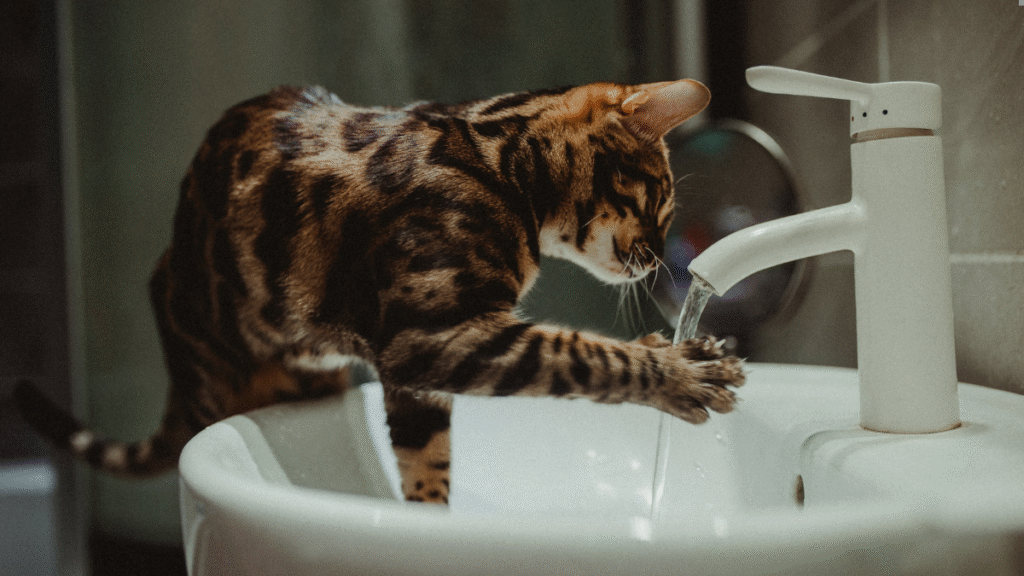Discovering cat urine on the carpet instead of in the litter box can be one of the most aggravating moments as a pet parent. You’re at your wits’ end cleaning up the mess while wondering: why is my cat peeing outside the litter box?
Your cat might seem like they’re just being difficult, but rest assured, that’s rarely the case. Most of the time, your feline friend is trying to tell you that something is wrong—whether they’re experiencing medical issues, stress, or simply dealing with an unclean or unpleasant litter box.
The good news is that once you identify the root of the problem and take steps to address it, there’s almost always an effective solution. Read on for expert tips and advice on how to help your cat stop peeing outside the litter box and regain their good habits.
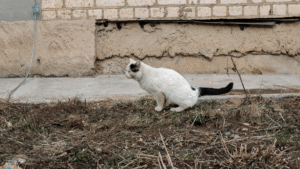
Why Is My Cat Peeing Outside the Litter Box?
Before exploring potential medical or behavioral reasons, it’s important to remember that your cat isn’t doing this on purpose. Cats are naturally clean animals that prefer having a specific spot for their bathroom needs. When they start peeing or pooping outside the litter box, it’s almost always a sign that something is off.
Below are the most common reasons cats pee outside their litter box—and what you can do about it.
Medical Causes
If your cat is experiencing pain or discomfort, they may associate it with the litter box and start avoiding it. You should always take your cat to the vet if they suddenly begin urinating outside the box.
Common medical causes of inappropriate urination include:
-
Urinary tract infection (UTI)
-
Bladder stones or crystals
-
Kidney disease
-
Diabetes
-
Arthritis
What to do: Schedule an immediate vet visit if your cat suddenly stops using the litter box. The veterinarian can perform a physical exam and urinalysis to rule out infections or other health problems. Once the underlying issue is treated, your cat will likely return to normal litter box use.
Related:Self-Cleaning Litter Boxes Explained
Behavioral and Environmental Causes
If your cat receives a clean bill of health, the issue is likely behavioral or environmental. Cats are highly sensitive creatures, and even small changes in their routine, environment, or litter box setup can cause distress.
Litter Box Problems
The most common behavioral reason cats start peeing outside the litter box is that something about it has become unappealing or uncomfortable.
Ask yourself:
-
Is my cat’s litter box clean enough?
-
Is the litter level sufficient?
-
Does my cat like the type of litter I’m using?
-
Is the litter box the right size for my cat?
-
Do I have enough litter boxes, and are they spread out?
-
Is the litter box covered or uncovered?
Solution: Always keep your cat’s litter box clean and place it in a quiet, low-traffic area that’s easily accessible. If you have multiple cats, provide one litter box per cat, plus one extra, and place them in different areas around the house.
Stress and Anxiety
Cats can easily become stressed or anxious, which can lead to inappropriate urination. Major changes in their lives, routines, or environments can all have an impact.
Common stressors include:
-
Moving to a new home
-
Introducing new pets or family members
-
Rearranging furniture or changing your schedule
-
Loud noises or seeing unfamiliar cats through windows
How to help your cat feel less stressed:
-
Maintain a consistent daily routine for feeding, playtime, and sleep.
-
Provide hiding spots and vertical spaces like cat trees or shelving.
-
Use calming products such as Feliway pheromone diffusers or sprays.
-
Spend at least 15 minutes a day playing and bonding with your cat.
If your cat’s anxiety is severe, your vet may recommend short-term medication or refer you to a behaviorist for a course of behavioral modification therapy.
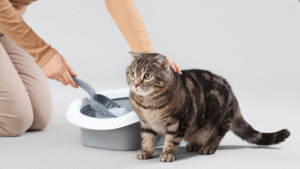
Territorial Marking
Sometimes, cats spray urine on surfaces as a way of marking territory rather than eliminating waste. This behavior is most common in unneutered males but can occur in spayed females and neutered males as well.
Spraying typically involves small amounts of urine on vertical surfaces, unlike accidents, which are usually on the floor.
Solutions:
-
Spay or neuter your cat if you haven’t already. This often reduces or eliminates marking behavior.
-
Clean all soiled areas with an enzymatic cleaner that neutralizes odors (never use ammonia-based cleaners, as they smell like urine).
-
Reduce territorial tension by minimizing conflicts between cats and ensuring each one has its own food, water, and litter box.
Dirty or Smelly Litter Boxes
Cats have a strong sense of smell and often refuse to use a litter box that isn’t clean. Even faint lingering odors can deter them.
Tips for keeping a clean litter box:
-
Scoop solid waste daily.
-
Change the litter completely every one to two weeks.
-
Wash the litter box with mild, unscented soap and warm water during litter changes.
-
Avoid strong-smelling cleaners or disinfectants.
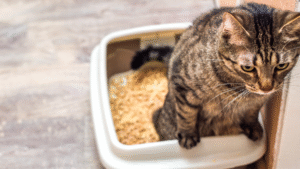
Location Problems
Cats value privacy when using the bathroom. A litter box in a noisy laundry room, near the dog’s bed, or in a high-traffic area can discourage use.
Tips for choosing a good litter box location:
-
Place litter boxes in quiet, easily accessible areas.
-
Avoid corners or tight spaces where your cat might feel trapped.
-
If you have multiple floors, provide at least one litter box per level.
How to Train Your Cat to Stop Peeing Outside the Litter Box
Once you’ve identified and addressed the root cause, you can retrain your cat to use the litter box.
1. Clean All Soiled Areas Thoroughly
Use an enzymatic cleaner to eliminate all urine odors. If your cat can still smell the urine, they’ll likely continue using that spot.
2. Block Access to Favorite Accident Spots
If your cat has a preferred spot, temporarily block it with furniture or use double-sided tape or tinfoil to discourage access.
3. Make the Litter Box Appealing Again
Keep it clean, use familiar litter, and reward your cat with treats or praise when they use it correctly.
4. Confine Your Cat (If Necessary)
If the problem persists, confine your cat to one room with their litter box, food, and water for a few days. Gradually expand their space once they consistently use the box.
5. Use Positive Reinforcement
Never punish your cat for accidents. Yelling or scolding will only increase stress and make the behavior worse. Focus on praise and patience instead.
Cleaning Cat Urine and Odors
Once your cat has urinated outside the litter box, it’s vital to remove all traces of odor to prevent repeat incidents.
Steps to remove cat urine odor:
-
Blot up as much urine as possible with paper towels.
-
Apply an enzymatic cleaner formulated for pet urine.
-
Avoid steam cleaners or heat, as they can set the odor.
-
If the smell persists, sprinkle baking soda on the area, let it sit overnight, and vacuum it up.
-
For soft furniture or bedding, wash with an enzymatic detergent and add one cup of white vinegar to the rinse cycle.
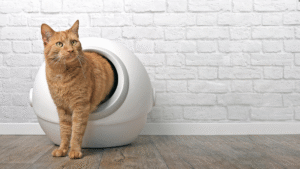
When to Seek Professional Help
If your cat continues to urinate outside the litter box despite your best efforts, consult an animal behaviorist or veterinarian who specializes in feline behavior. Persistent issues could be linked to chronic stress, anxiety, or an underlying medical condition that needs further attention.
Final Thoughts
We hope this guide helps you understand and solve your cat’s litter box issues. Remember, your cat isn’t peeing outside the box out of spite—they’re trying to tell you that something isn’t right.
Whether it’s pain, stress, or dissatisfaction with the litter box setup, identifying and addressing the cause is the key to solving the problem and preventing it from returning.
Save pin for later
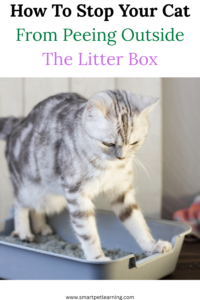
- Why Cats Avoid Eye Contact - January 31, 2026
- How to Stop Cats From Climbing Where They Shouldn’t - January 31, 2026
- Why Dogs Get Hyper at Night - January 31, 2026
